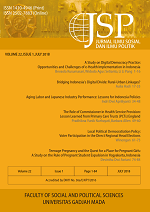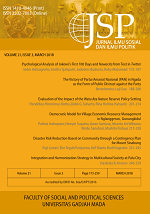Divergent Interpretations and Inter-Organizational Relations of Halal Product Guarantee Policy in Indonesia
Agus Iswanto(1*), Koeswinarno Koeswinarno(2)
(1) Office of Religious and Research, Semarang, Religious Research Development and Training Agency, Ministry of Religious Affairsn
(2) Center for Research and Development of Religious Guidance and Services, Religious Research Development and Training, Ministry of Religious Affairs
(*) Corresponding Author
Abstract
The emergence of the issue of halal products, both in the form of food and services, has also led to competition regarding the certification of halal products. Studies on competition between certification bodies have been carried out, but these studies do not focus on the competition that occurs in Southeast Asian countries, including Indonesia which is a big market for the halal industry. In Indonesia, the implementation of the regulation of Halal Product Guarantee (HPG) in Law No. 33 2014 still raises problems, including the related issue of inter-organizational relations. This article discusses the relations between organizations based on the interpretation of each party related to the Halal Product Guarantee policy, and the consequences arising from it. This article used new institutional theory, and a semiotics approach as analysis of verbal signs and gestures raised by each of the parties. This article argued that the interpretations of each organizational actor towards the new halal certification policy in Indonesia are driven by different institutional reasons/logics, resulting in contradictions, even conflicts related to the relationship between organizations implementing the policy. The difference in meaning, especially in the connotative meaning, shows the difference in institutional logic. Thus, there is a divergence in meaning. Therefore, it is important to equate significance (meaning/interpretation) to each of the institutions related to Halal Product Guarantee in order to realize the implementation of the regulations properly.
Keywords
Full Text:
PDFReferences
Afroniyati, L. (2014). Analisis Ekonomi Politik Sertifikasi Halal Oleh Majelis Ulama Indonesia. JKAP: Jurnal Kebijakan & Administrasi Publik, 18(1), 37–52. https://doi.org/https://doi.org/10.22146/jkap.6870
Akim, A., Konety, N., Purnama, C., & Korina, L. C. (2019). The Shifting of Halal Certification System in Indonesia: From Society-Centric To State-Centric. MIMBAR : Jurnal Sosial Dan Pembangunan, 35(1), 115–126. https:// doi.org/10.29313/mimbar.v35i1.4223
Anwar, M. K., Fahrullah, A., & Ridlwan, A. A. (2018). The Problems of Halal Certification for Food Industry in Indonesia. International Journal of Civil Engineering and Technology, 9(8), 1625–1632. Retrieved from http://www.iaeme. com/ijciet/issues.asp?JType=IJCIET&VTy pe=9&IType=8%0A1.
Arnold, S. J., Kozinets, R. V., & Handelman, J. M. (2001). Hometown ideology and retailer legitimation: The institutional semiotics of Wal-Mart flyers. Journal of Retailing, 77(2), 243–271. https://doi. org/10.1016/S0022-4359(01)00046-X
Asa, R. S. (2019). An Ov erview of the Developments of Halal Certification Laws in Malaysia, Singapore, Brunei and Indonesia. Jurnal Syariah, 27(1), 179.
Atkinson, C. L. (2018). Semiotic Theory and Public Administration. In A. Farazmand (Ed.), Global Encyclopedia of Public Administration, Public Policy, and Governance (pp. 1–6). Cham: Springer International Publishing. https://doi. org/10.1007/978-3-319-31816-5
Atkinson, C. L. (2019). Semiotic Analysis and Public Policy. Semiotic Analysis and Public Policy. New YOrk and London: Routledge. https://doi.org/10.4324/9781351205993-2
Barthes, R. (1972). Mythologies (25th print). New York: The Noonday Press.
Barthes, R. (1986). Elements of Semiology (11th print). New York: Hill and Wang.
Barthes, R. (1992). Empire of Signs (10th editi). New York: Hill and Wang.
Bergeaud-Blackler, F. (2015). The halal certification market in Europe and the world: A first Panorama. In F. Bergeaud-Blackler, J. Fischer, & J. Lever (Eds.), Halal Matters: Islam, Politics and Markets in Global Perspective (pp. 105–126). London and New York: Routledge Taylor and Francis Group. https://doi.org/10.4324/9781315746128-7
Berger, A. A. (2015). Pengantar Semiotika: Tanda- Tanda dalam Kebudayaan Kontemporer (4 edition). Yogyakarta: Tiara Wacana.
Bertels, S., & Lawrence, T. B. (2016). Organizational responses to institutional complexity stemming from emerging logics: The role of individuals. Strategic Organization (Vol. 14). https://doi.org/10.1177/1476127016641726
Bondestam, F. (2004). Signing up for the status quo? Semiological analyses of sexual harassment in higher education—a Swedish example. Higher Education in Europe, 29(1), 133–145. https://doi.org/10. 1080/03797720410001673346
Christomy, T. (2010). Peircean dan Kajian Budaya. In T. Christomy & U. Yuwono (Eds.), Semiotika Budaya (pp. 110–143). Depok: Pusat Penelitian Kemasyarakatan dan Budaya, Fakultas Ilmu Pengetahuan Budaya Universitas Indonesia.
Faidah, M. (2017). Sertifikasi Halal di Indonesia: Dari Civil Society menuju Relasi Kuasa Antara Negara dan Agama. Islamica: Jurnal Studi Keislaman, 11(2), 449–476. https://doi.org/https://doi.org/10.15642/ islamica.2017.11.2.449-476
Fiol, C. M. (1989). A Semiotic Analysis of Corporate Language: Organizational Boundaries and Joint Venturing. Administrative Science Quarterly, 34(2), 277–303. https://doi.org/10.2307/2989899
Garrick, B. G., & Pendergast, D. (2014). The impact of national agenda on a local education authority’s website: a visual semiotic analysis. Cambridge Journal of Education, 44(3), 299–317. https://doi.org/10.1080/0305764X.2014.904273
Goodsell, C. T. (1977). Bureaucratic Manipulation of Physical Symbols: An Empirical Study. American Journal of Political Science. https://doi.org/10.2307/2110449
Greenwood, R., Díaz, A. M., Li, S. X., & Lorente, J. C. (2010). The multiplicity of institutional logics and the heterogeneity of organizational responses. Organization Science , 21 (2), 521–539. https://doi. org/10.1287/orsc.1090.0453
Greenwood, R., Raynard, M., Kodeih, F., Micelotta, E. R., & Lounsbury, M. (2011). Institutional complexity and organizational responses. Academy of Management Annals, 5(1), 317–371. https:// doi.org/10.1080/19416520.2011.590299
Hoed, B. H. (2010). Bahasa dan Sastra dalam Tinjauan Semiotik. In Semiotika Budaya. Depok: Pusat Penelitian Kemasyarakatan dan Budaya, Fakultas Ilmu Pengetahuan Budaya Universitas Indonesia.
Hoed, B. H. (2011). Semiotik dan Dinamika Sosial Budaya. Depok: Komunitas Bambu.
Hosen, N. (2012). Hilal and Halal: How to manage islamic pluralism in Indonesia? Asian Journal of Comparative Law, 7(1), 1–18. https://doi.org/10.1515/1932-0205.1418
Kurland, N. B., & Aleci, L. S. (2015). From civic institution to community place: the meaning of the public market in modern America. Agriculture and Human Values, 32(3), 505–521. https://doi.org/10.1007/s10460-014-9579-2
Latif, I. A., Mohamed, Z., Sharifuddin, J., Abdullah, A. M., & Ismail, M. M. (2014). A Comparative Analysis of Global Halal Certification Requirements. Journal of Food Products Marketing, 20(85), 85–101. https:// doi.org/10.1080/10454446.2014.921869
Lindsey, T. (2012). Monopolising Islam: The Indonesia Ulama Council and State Regulation of the “Islamic Economy.” Bulletin of Indonesian Economic Studies, org/10.1080/00074918.2012.694157
Magnis-Suseno, F. (2019). Etika Politik: Prinsip Moral Dasar Kenegaraan Modern (10th ed.). Jakarta: PT Gramedia Pustaka Utama.
Nafis, M. C. (2019). the Concept of Halal and Thayyib and Its Implementation in Indonesia. Journal of Halal Product and Research, 2(1), 5. https://doi.org/10.20473/ jhpr.vol.2-issue.1.1-5
NU Online. (2020). Cacat Yuridis , PBNU Tolak Monopoli Fatwa MUI pada UU Jaminan Produk Halal. Retrieved February 2, 2020, from https://www.nu.or.id/post/ read/114219/cacat-yuridis--pbnu-tolak- monopoli-fatwa-mui-pada-uu-jaminan- produk-halal ?
Othman, B., Shaarani, S. M., & Bahron, A. (2016). The potential of ASEAN in halal certification implementation: A review. Pertanika Journal of Social Sciences and Humanities, 24(1), 1–24. Retrieved from http://www.pertanika.upm.edu. my/%0AReview
Pache, A. C., & Santos, F. (2010). When worlds collide: The internal dynamics of organizational responses to conflicting institutional demands. Academy of Management Review, 35(3), 455–476. https:// doi.org/10.5465/AMR.2010.51142368
Pasoloran, O. (2016). Narsisisme Dana Aspirasi Masyarakat Dalam Penganggaran Daerah : Kajian Etno-Semiotika. In Simposium Nasional Akuntansi XIX (pp.1–30). Bandar Lampung: Universitas Lampung, Fakultas Ekonomi dan Bisnis. Retrieved from http://elib.ibs.ac.id/materi/ Prosiding/SNA XIX (19) Lampung 2016/ makalah/106.pdf
Prabowo, S., Rahman, A. A., Rahman, S. A., & Samah, A. A. (2015). Revealing factors hindering halal certification in East Kalimantan Indonesia. Journal of Islamic Marketing, 6(2), 268–291. https://doi. org/10.1108/JIMA-05-2014-0040
Rapport, N., & Overing, J. (2000). Social and Cultural Anthropology: The Key Concepts. Plastic and Reconstructive Surgery (1st ed., Vol. 63). London and New York: Routledge.
Reay, T., & Hinings, C. R. (2009). Managing the rivalry of competing institutional logics. Organization Studies, 30(6), 629–652. https://doi.org/10.1177/0170840609104803
Saputra, A. (2020). RUU Cipta Lapangan Kerja , Omnibus Law Hapus Kewajiban Makanan Harus Bersertifikat Halal ! Retrieved February 3, 2020, from https://news. detik.com/berita/d-4867063/ruu-cipta- lapangan-kerja-omnibus-law-hapus- kewajiban-makanan-harus-bersertifikat- halal 1/6
Soekanto, S. (1989). Sosiologi: Suatu Pengantar. Jakarta: Rajawali Press.
Suharko, S., Khoiriati, S. D., Krisnajaya, I. M., & Dinarto, D. (2018). Institutional conformance of Halal certification organisation in Halal tourism industry: The cases of Indonesia and Thailand. Tourism, 66(3), 334–348.
Sunardi, S. (2004). Semiotika Negativ a. Yogyakarta: Buku Baik.
Thomann, E., Lieberherr, E., & Ingold, K. (2016). Torn between state and market: Private policy implementation and conflicting institutional logics. Policy and Society, 35(1), 57–69. https://doi.org/10.1016/j. polsoc.2015.12.001
Thornton, P. H., Ocasio, W., & Lounsbury, M. (2015). The Institutional Logics Perspective. In Emerging Trends in the Social and Behavioral Sciences. https://doi.org/10.1002/9781118900772.etrds0187
Thornton, P., Ocasio, W., & Lounsbury, M. (2015). The Institutional Logics Perspective. In Emerging Trends in the Social and Behaviorial Sciences (Vol. 53, pp.1689–1699).
Viverita, & Kusumastuti, R. D. (2017). Awareness of halal certification of micro and small enterprises in Jakarta. International Journal of Economics and Management, 11(2 Special Issue), 459–471.
Wahyudi, H., Asikin, Z., & Haq, H. (2020). Construction of the Legal Framework for Strengthening the Halal Industry in Indonesia. International Journal of Multicultural and Multireligio us Understanding, 7(1), 429–438. https://doi. org/http://dx.doi.org/10.18415/ijmmu. v7i1.1321
Wareing, S. (2004). What is language and what does it do? In I. Singhs & S. Peccei (Eds.), Language, Society and Power: An Introduction (Second, pp. 1–16). London: Routledge.
Widaningrum, A. (2017). Public Trust and Regulatory Compliance. Jurnal Ilmu Sosial Dan Ilmu Politik, 21(1), 1–13. https://doi. org/10.22146/jsp.28679
Zulkifli, Z., & Mochammad Sahid, M. (2018). Pensijilan Halal: Prosedur dan Implementasi Di Indonesia. Malaysian Journal of Syariah and Law, 8(2), 49–59. https://doi.org/10.33102/mjsl.v6i3.125
Article Metrics
Refbacks
- There are currently no refbacks.
Copyright (c) 2021 Jurnal Ilmu Sosial dan Ilmu Politik

This work is licensed under a Creative Commons Attribution-NonCommercial-NoDerivatives 4.0 International License.






















